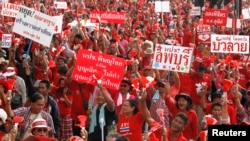Thailand's military-led government is facing growing criticism for again delaying the next general election that is supposed to return the country to civilian rule, at least nominally.
The military junta, known as the National Council for Peace and Order (NCPO), has been in power since May 2014, and has set out a "political roadmap" for elections that were first set to take place in 2016.
The prime minister, General Prayut Chan-o-cha, then set the date in November before the military-appointed National Legislative Assembly pushed the date back to February 2019.
Criticism mounted, with foreign diplomats joining a chorus of protests that included Thai NGOs and opposition groups.
"The number of times now they have delayed this election; basically it went from one year to two years to three years to four years. It's just too much and people have lost patience," said Chris Baker, a commentator and author on Thai politics.
Baker said a weak domestic economy is also undermining support for the government and adding to the climate of discontent.
Also eroding the government's support is a scandal involving the deputy prime minister, Prawit Wongsawon, who has touched off a firestorm of public criticism for wearing luxurious watches estimated to be valued at more than $1.2 million.
General Prayut, in recent media comments, has avoided making any commitment binding the junta to step down after the election.
Government officials blame the delays on legislative obstacles.
The Thai military took power in May 2014 following months of anti-government protests against the elected government of Prime Minister Yingluck Shinawatra. The protests were initially triggered by the Yingluck government's attempt to pass an amnesty bill to clear her older brother and former leader, Thaksin Shinawatra, who fled Thailand in 2008 while facing corruption charges.
Thaksin, a populist who pushed policies favoring Thailand's rural poor and middle classes, triggered deep political polarization in the kingdom. The policies helped Thaksin and his supporters win several elections, while his "Red Shirt" movement also challenged Bangkok's elite establishment.
Analysts say that while there is increasing criticism of the military government and of corruption, many in the middle class also fear a return of a pro-Thaksin government and renewed upheaval.
But Kraisak Choonhavan, a former senator and member of Thailand's Democrat Party, said there is discontent even among former supporters of the military known as "Yellow Shirts."
"A lot of the Yellow [shirts] are unhappy also because they have been penalized quite heavily for their political activities against Thaksin," Kraisak told VOA.
Rights groups say the military, facing a loss of popularity, has also stepped up suppression of criticism and anti-government protests. All gatherings of more than five people are currently banned.
A crackdown on online commentaries has led to the charging of a respected Thai historian, Charnvut Kasetsiri, and a dean from Thammasat University, Anusorn Unno. Thai police are also investigating organizers of recent demonstrations, including a group that called for early elections.
But Titipol Phakdeewanich, dean of political science at Ubon Ratchathani University, said any delay in the election is unlikely to have a major impact on many Thais who have adjusted to life under military rule.
"I don't think [a delay] would have a strong impact because of the power and the kinds of legal mechanisms that the NCPO [junta] have. They use [these] to suppress people," Titipol said.
He said the military has also sought to win support by applying populist economic policies in rural areas, supporting farmers with price subsidies and give-aways, undermining grass root support for the pro-Thakisn Red Shirt movement.
The next step in the political process is due to come in March when new political parties will have the opportunity to register members — a full month before existing major parties such as the Democrats and pro-Thaksin Pheu Thai parties will be required to register members — a move analysts say is meant to favor a bid by General Prayut to remain in power.










